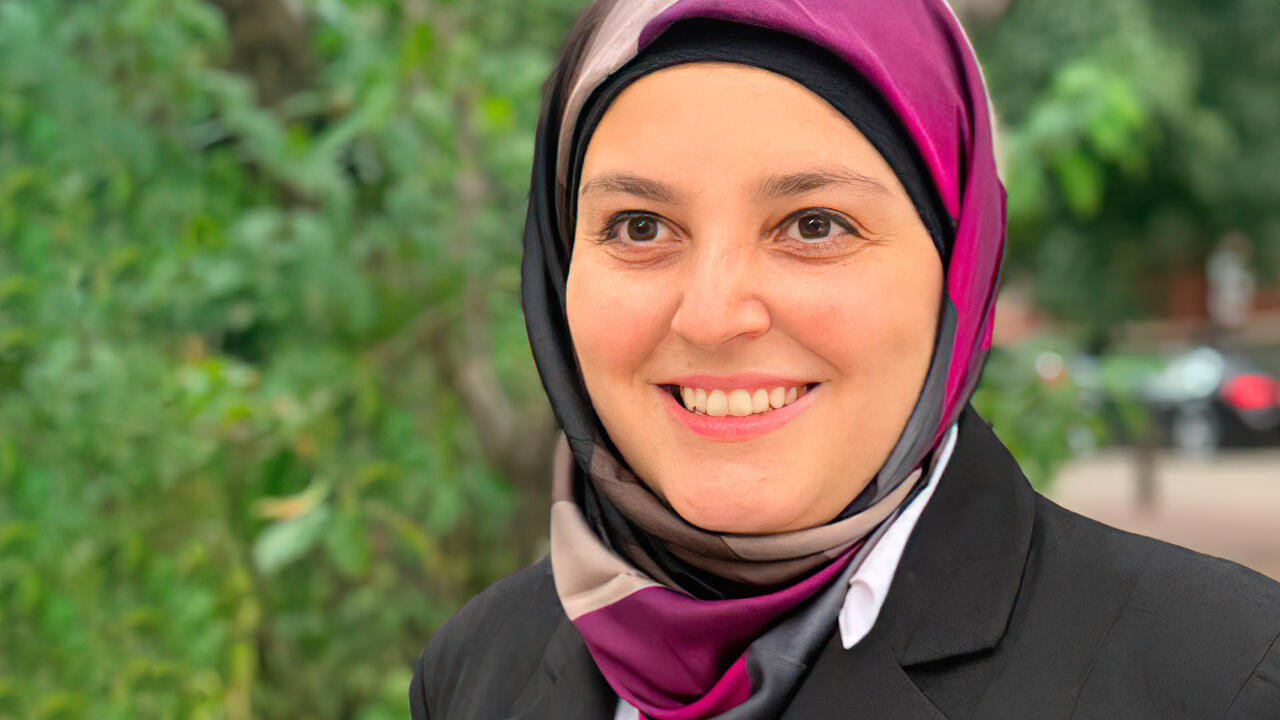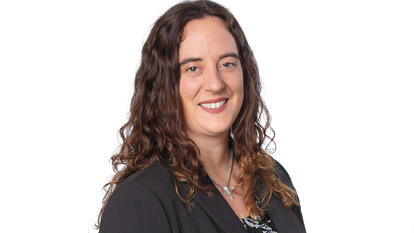
Mona Minkara ’09 Documents International Travel as a Blind Person
Mona Minkara ’09, a Boston-based research scientist and professor, approaches international travel with equanimity and fearlessness, as anyone should when embarking on a journey to an unfamiliar city. What differentiates Minkara, however, is that she is blind, and she has turned her adventures into a documentary series about public transportation accessibility around the world.
Minkara received funding for Planes, Trains and Canes, which is available on YouTube, from the 2019 Holman Prize for Blind Ambition, launched by the LightHouse for the Blind and Visually Impaired to encourage individuals “to explore the world and push their limits.” On her website, she says the series “seeks to understand cultural perceptions about disabilities, such as blindness” and “how social norms influence infrastructural systems.” Minkara said public transportation gives her freedom, and when she applied for the Holman Prize, she wanted to offer a project that would celebrate that system and to experience it in “different parts of the world, and show the world that blind people can travel on their own if they want to.”
Minkara, who double majored in chemistry and Middle Eastern studies at Wellesley and is now an assistant professor of bioengineering at Northeastern University, describes herself as a “knowledge catalyst,” to which she ascribes four traits: curiosity, engagement, discovery, and sharing what she’s learned. “That’s literally what I do through my science,” she said. “I’m not just discovering in the lab. I’m going out and teaching because I love that part of it. I don’t just experience the world as a blind person. I’m sharing it with the world through these videos.”
“I don’t just experience the world as a blind person. I’m sharing it with the world through these videos.”
Mona Minkara ’09
The videos offer a raw perspective. Minkara said that before she left Boston for Johannesburg, South Africa, to film the first episode, she hadn’t researched the city or its public transportation system. She wanted her experience to be as real as possible. She instructed the videographer, who is also a friend, not to interfere as she moved from place to place but simply to record the process unless Minkara explicitly asked for assistance. Her friend intervened just once, when Minkara was trying to cross a busy intersection and nearly got hit by a speeding car. “She followed my lead, and that’s very important,” Minkara said, “because that’s very empowering.”
Throughout the series, well-meaning people try to assist Minkara in various ways, from pulling on her cane (highly discouraged) to walking with her to her destination. In her travels, which all took place before the pandemic, there are moments when Minkara tries to get someone’s attention to ask for guidance, but no one stops. At other times, fellow travelers sense Minkara’s uncertainty and stop to ask if she needs assistance—like a woman in London who missed her train to help Minkara get her luggage down the stairs at a station that had no escalator or elevator, and a man in Istanbul who showed her what bus she needed to get to Beşiktaş, stayed with her until it arrived, guided her to it, and paid for the ticket, all while speaking Turkish, a language Minkara doesn’t know. Watching her engage so openly and comfortably in situations that could make even sighted travelers uncomfortable is inspiring and illuminates the importance of human connection. “I assume the best of the people around me,” she said. Even in cities where she didn’t speak the language, “I could still connect with human beings.”
Minkara hopes her series will reach a variety of audiences, including sighted individuals who have never thought about whether there are Braille signs in elevators, auditory signals at crosswalks, and cane guides in train terminals. She hopes the levity she brings to the experience comes across, too. “Disabilities are so often discussed in somber conversations,” she said, about difficulties, what was lost, what is missing. She wanted to bring a bit of a comedic, light-hearted lens to her experience. With Planes, Trains and Canes, Minkara hopes to expand people’s expectations of what it is like to live with blindness. In the series, Minkara notes at one point that it’s society that limits blind people much of the time.
Minkara would love to find funding for a second season of Planes, Trains and Canes to continue to add to the conversation around inclusion for people with disabilities. She already knows which cities she would like to visit; one is Stockholm, “because it’s advertised as the most accessible public transportation system,” she said.
In the meantime, she continues to act as a knowledge catalyst—researching, teaching, and carving a path for future blind scientists by offering Blind STEM Curriculum, which she and her team developed, and 3D molecular modeling kits for visually impaired learners.
“Vision is more than sight,” Minkara likes to say, and she is living proof. She invites anyone who wants to see for themselves to follow her on social media and subscribe to the documentary series.



